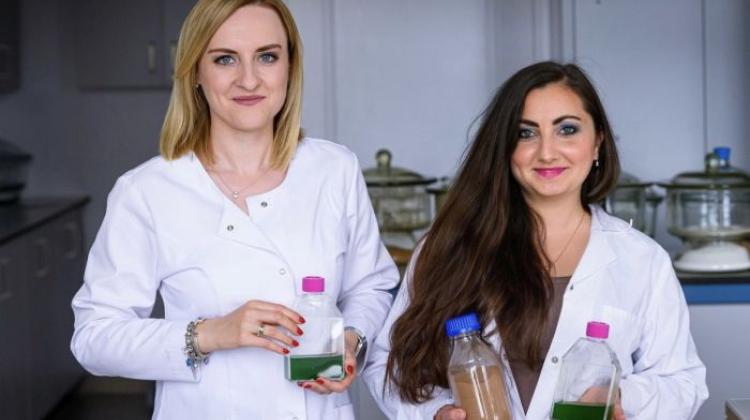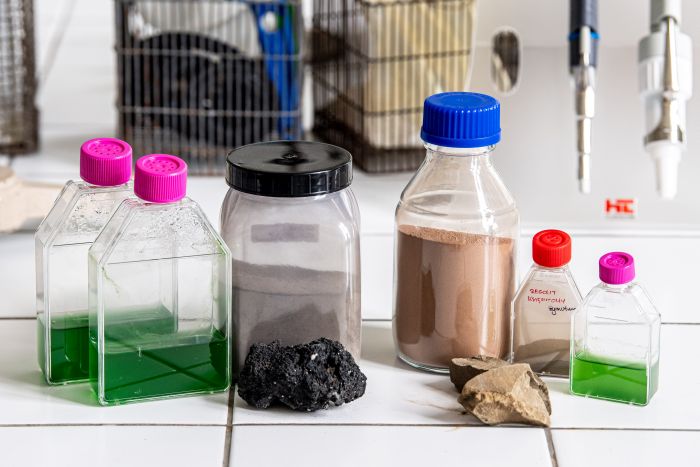Wrocław scientists working on obtaining minerals from the lunar and Martian regolith
 Dr. Weronika Urbańska and Ewa Borowska. Photo from press release
Dr. Weronika Urbańska and Ewa Borowska. Photo from press release
Polish scientists, including Dr. Weronika Urbańska from the Wrocław University of Science and Technology, are working on obtaining minerals from the lunar and Martian regolith using microalgae and bacteria. According to scientists, this could be crucial for the exploration of the Moon.
Regolith is the weathered, loose rock that covers the Earth and other rocky planets and moons. It is formed when the rock is subjected to long-term physical and chemical processes. According to scientists, while the lunar and Martian regoliths differ in composition, they have one thing in common - critical metal elements can be recovered from both.
One way to do this is to use extremophilic microorganisms, such as volcanic microalgae, bacteria or fungi. 'A group of Polish scientists is working on such a solution. Dr. Weronika Urbańska from the Faculty of Environmental Engineering of the Wrocław University of Science and Technology, Ewa Borowska, a doctoral candidate at the College of Inter-Faculty Individual Studies in Mathematics and Natural Sciences at the University of Warsaw, Dr. Jakub Ciążela from the Institute of Geological Sciences of the Polish Academy of Sciences and Dr. Anna Potysz from the University of Wrocław have jointly developed a method for the biological recovery of metals from the lunar and Martian regolith,’ a press release from the Wrocław University of Science and Technology says.
Doctoral candidate Ewa Borowska explains that scientists use several strains of microalgae from volcanic areas with high concentrations of heavy metals, carbon dioxide and hydrogen sulphide. 'Microalgae living in such environments have a natural predisposition to adapt to difficult conditions, and their unique structure allows them to extract heavy metals very efficiently,’ she says.

The scientists point out that in the upcoming lunar exploration missions, and in the future also expeditions to Mars, there are plans to establish research stations, and for their construction it will be necessary to use the raw materials available on site, because their transport from Earth it is basically unfeasible.
'When we additionally realize that we are already beginning to experience shortages of critical raw materials on Earth, it turns out that obtaining them in space, for example from regolith, may be crucial for the research planned there. Since we already have developed methods that work on Earth, then why not try to use them also in space,’ says Dr. Urbanska.
Another argument for the use of microalgae and bacteria in space missions is by the ease of transport. 'A small amount of them is enough to start the whole process. This is of great importance in the case of cargo carried on board space rockets,’ the scientists say.
According to the Wrocław University of Science and Technology press release, research on the use of microorganisms, including fungi, for the recovery of raw materials is carried out all over the world, for example in scientific teams of NASA and the European Space Agency (ESA). 'The solution of our scientists, combining microalgae with bacteria, is unique in this respect,’ says the press release.
The solution involves the simultaneous use of bacteria and microalgae. 'In the first stage, bacteria partially extract metal elements, and in the next stage, microalgae are involved in this process. Scientists are able to recover the desired raw materials from the resulting biomass,’ the researchers say.
Initial research was first conducted on battery powder, and then on lunar and Martian regolith simulators. 'Importantly, scientists also managed to develop a solution that enables the growth of algae and bacteria with minimal use of water. It was based on natural geomicrobiological processes involving both bacteria and algae used by scientists,’ the press release says.
Dr. Urbanska adds: ‘Based on preliminary analyses of the results of our research, we can already say that we have achieved several dozen percent efficiency in the recovery of elements. Now we have to perform precise parameterisation and optimisation of the entire process, but the results are already satisfactory and comparable to commonly \used chemical methods.’
Scientists are currently focusing on the recovery of lithium, cobalt, copper and nickel, which have recently been included in the list of critical raw materials. 'In the future, we would like to extend our research to include rare earth metals,’ Urbanska says. (PAP)
PAP - Science in Poland, Agata Tomczyńska
ato/ zan/ kap/
tr. RL
Przed dodaniem komentarza prosimy o zapoznanie z Regulaminem forum serwisu Nauka w Polsce.















